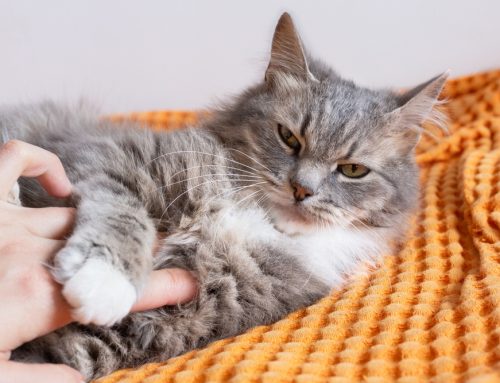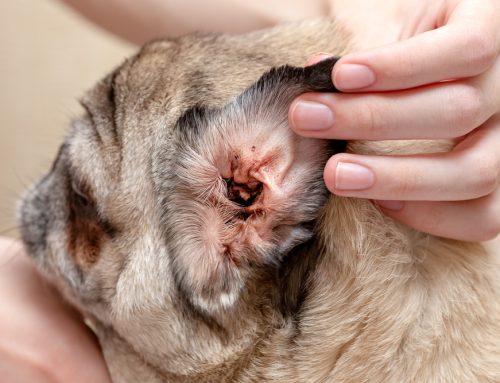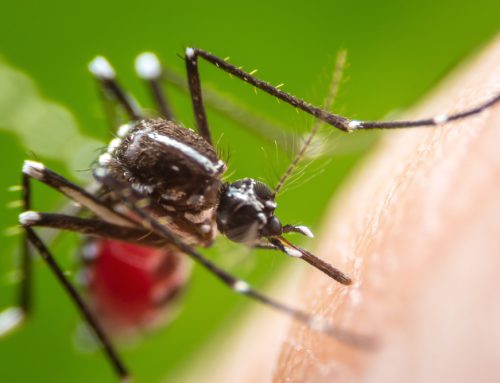Pet owners naturally want the best for their faithful companions, and take every step possible to keep their furry friend safe from harm. When it comes to vaccinations, however, many owners are concerned about the potential for over-vaccination and reactions, and whether all the vaccinations are necessary. To help clear up any confusion, and to highlight the importance of this life-saving aspect of wellness care, we’ve answered some of the most common questions we receive about pet vaccinations.
Question: What is a vaccine?
Answer: Vaccines are products designed to trigger an immune response, and prepare your pet’s immune system to fight future infections from disease-causing pathogens, like viruses and bacteria, by developing antibodies to the disease. Then, if your pet comes in contact with the pathogen, their immune system is primed and ready for battle. By appropriately vaccinating your pet, you can prevent, or lessen, potential future illnesses.
Q: What vaccinations should my dog receive?
A: During your dog’s wellness appointment, our team at Countryside Veterinary Hospital takes a detailed history, and discusses your pet’s lifestyle and exposure risk, to create a personalized vaccination protocol. While all dogs receive core vaccinations (i.e., those recommended for all dogs because of disease severity, and ease of transmission), our canine patients receive non-core vaccinations based on their lifestyle. Core vaccinations for dogs include:
- Canine distemper virus
- Adenovirus-2
- Parvovirus
- Rabies
Non-core vaccinations for dogs include:
- Leptospirosis
- Lyme
- Bordetella
- Canine influenza
As your pet ages, their exposure risk may change, and their vaccination protocol will follow suit. For example, your puppy may undergo a series of training classes, necessitating Bordetella and canine influenza vaccinations, but when they are older, they leave home only for neighborhood walks, reducing the need for vaccination against upper respiratory diseases. At each wellness visit, we will reassess your pet’s needs, to ensure they receive the appropriate vaccinations.
Q: What vaccinations should my cat receive?
A: Cats are similar to dogs in that their vaccinations are also divided into core and non-core categories. Core vaccinations for cats include:
- Feline viral rhinotracheitis (i.e., herpes)
- Calicivirus
- Panleukopenia
- Rabies
Feline leukemia is the only non-core vaccination for cats that we recommend, and vaccination is based on exposure risk.
Q: How often does my pet need vaccinations?
A: Your pet’s vaccination protocol can vary with the vaccine type administered, local laws, and your pet’s age, lifestyle, and other health factors. In general, core vaccines provide immunity for several years after the initial series, and then boosters should be administered in the appropriate time-frame at your pet’s annual wellness exam. Remember—your pet may not require boosters for all vaccinations every year, but an annual wellness exam is essential for spotting illnesses or issues in their earliest stage, when treatment has the best chance for success. Yearly preventive visits are much more than a round of “shots”—they are key to keeping your best friend in good health.
Q: Can’t I have titer testing performed instead of vaccinations for my pet?
A: Titers are an antibody measurement against a disease that develops in response to a vaccination. However, not all of the many different antibodies can be measured. Additionally, although some diseases can be measured for antibodies, their measurement does not reliably predict protection. Nevertheless, titer tests have proven a reliable indicator of protection for some diseases, including canine and feline distemper, canine parvovirus, and canine adenovirus. Titers for feline herpes and calicivirus are also available, but are not such good predictors, because these viruses often mutate. Rabies titers can be checked, but they are not considered a legal replacement for vaccination in most places. For all these reasons, titer testing is not currently recommended for the general pet population.
Q: What do I watch for after my pet receives vaccinations?

A: The vast majority of pets do not suffer any adverse reactions from vaccinations, and the benefits far outweigh the risks. Potential side effects include:
- Mild, low-grade fever
- Tenderness at the injection site
- Mild lethargy for one to two days
- A temporary lump at the vaccination site
These are not adverse reactions, but expected responses from the immune system to a vaccine. Mild side effects can be mitigated with antihistamine or corticosteroid usage prior to vaccination, so let us know, for our records, if your furry pal seems especially slow and sensitive after their vaccinations.
More serious, but much less common, reactions after vaccinations include extreme lethargy, vomiting, diarrhea, hives, and respiratory difficulty. If your pet develops any of these issues, contact us immediately.
Vaccinations are an essential part of your pet’s overall wellness plan, and a key player in warding off infectious diseases. By scheduling routine preventive care visits for your four-legged friend, you can ensure they remain healthy, and protected from a variety of serious illnesses. Call us to schedule your furry pal’s wellness visit, and booster their life-saving vaccinations.








Leave A Comment